- Home
- Robert B. Parker
Widow’s Walk Page 4
Widow’s Walk Read online
Page 4
“We’ll see,” I said.
CHAPTER TEN
I was in my office tilted back in my chair with my feet up drinking a cup of coffee and eating my second corn muffin while I reread the list of Mary Smith’s closest friends. The sunlight sprawled its familiar light across my desk. Behind me I had the window open and the pleasant traffic sounds drifted up from the point where Berkeley Street intersects with Boylston. There was nothing new. Still no names with asterisks indicating a possible murderer. Just a bunch of mostly Anglo-Saxon names with mostly business addresses. One of the business addresses was Soldiers Field Development Ltd. Oh ho! I had taken to saying Oh ho! in moments like this ever since Susan had suggested that ah ha! was corny. The address was for someone named Felton Shawcross, who was listed as CEO. I took a bite of corn muffin. It’s hard to think when you’re hungry. It is also hard to think when you don’t have anything to think about. Something might develop out of the clue. But right now it was just a clue. I finished my corn muffin, drank the last of my coffee, washed my hands and face, and headed off down Berkeley Street toward the South End. By the time I crossed Columbus Ave. I knew I was being followed again, on foot this time. A dark curly-haired guy with a big mustache had gotten out of a black Chrysler sedan as soon as I had come out of my building. The sedan had been double-parked in front of FAO Schwarz on the corner of Boylston and Berkeley, and pulled away down Boylston right after Curly got out. He was so conscientious in paying me no attention that I spotted him almost at once. Though in his defense, I suppose, I was looking for him. Berkeley Street was one way the other way, so I knew that if they were tailing me again, it would have to be on foot. Larson Graff’s place of business was a red brick row house on Appleton Street. The office was on the first floor. Graff lived above the store. Graff’s desk was in the bow window of a room that was probably once the dining room. It was a vast pale oak piece, with thickly turned legs. The window behind it was punctuated occasionally with panes of stained glass. Through it I could see Curly standing innocently across the street talking on his cell phone.
Graff was immaculate in a double-breasted blue blazer, a yellow silk tie, and a starched white broadcloth shirt. He stood to shake my hand.
“Mr. Spenser,” he said. “How nice to see you again.”
“Everybody says that.”
Graff smiled uncertainly. “Well,” he said. “I’m sure they mean it.”
He gestured me toward a client chair. I sat. Maybe it was better not to kid with Larson.
“I wanted to thank you for the list of names you sent over on behalf of Mary Smith,” I said.
“Oh, no problem. Just run it off on the computer, you know.”
“Yes. Do you know anybody that’s friendly with Mrs. Smith who is not on the list?”
Graff’s eyes widened.
“Not on the list?”
“Yeah. Maybe a pal from the old neighborhood? People she used to play miniature golf with?”
“Miniature golf?”
“Maybe an old boyfriend?”
“Perhaps you should ask Mrs. Smith.”
“Oh, I will,” I said. “This is just background. Make sure to touch all bases and all that.”
Graff nodded as if he weren’t so sure.
“You must know a name,” I said. “One name.”
It’s an old trick, ask for one name, implying that if you get it you’ll go away and leave them alone. Graff fell for it.
“Well, there’s Roy,” he said.
“And there’s Siegfried,” I said.
Graff looked as if he didn’t find me amusing. It was a look I’ve grown familiar with.
“Roy Levesque,” Graff said. “I believe she went to high school with him.”
“Do you have an address for Roy?” I said.
“I believe he lives in Franklin.”
Through the window I could see the Chrysler sedan cruise up and pause in front of where Curly was standing.
“Anybody else?” I said.
“You said one name.”
“I’m not very trustworthy,” I said. “You must know one more name.”
He didn’t bite the second time. Most of the time they don’t. But the effort was there.
“I’m dreadfully sorry, Mr. Spenser, I really don’t. I’m sure Mrs. Smith can help you.”
“I’m sure,” I said. “When you accompany her socially, are you paid for your time?”
Graff looked like he wanted to hang one on my kisser, though it seemed unlikely that he would.
“I am on retainer to Mrs. Smith,” Graff said.
“To do what?” I said.
“She has a very crowded and committed social calendar,” Graff said. “I help her organize it.”
Graff sounded as if he were not as pleased to see me as he had said he was when I came in.
“How about Mr. Smith?”
“He was not as socially oriented as Mrs. Smith.”
Outside the Chrysler moved away from Curly and cruised slowly down Appleton toward Berkeley. Curly remained, strolling up and down looking at roof lines, admiring the architecture.
“You and Mr. Smith friendly?” I said.
Graff looked offended. “Why do you ask?”
“I have no idea,” I said. “I’m just a gabby guy.”
“Oh, I’m sure,” Graff said.
“So were you friendly?”
“He was always a gentleman,” Graff said.
“But?”
“But nothing at all. I worked for Mrs. Smith. Mr. Smith was always pleasant. I don’t know him very well.”
“How about Marvin Conroy?”
“I’m sorry, I don’t know him.”
“Amy Peters?”
Graff shook his head. “I’m sorry, Mr. Spenser, but I really must cut this short. I have a client meeting that I’m already late for.”
“With whom?” I said.
“That is really none of your business, Mr. Spenser.”
I fought back the impulse to say, Well, I’m making it my business. Susan would be proud of me. I stood. We shook hands. And I went out to take Curly for a walk.
CHAPTER ELEVEN
Once you know you’re being tailed it is easy to spot it. Today we were cruising along Route 495. Me and my shadow. They were driving another black car, an Explorer. Everybody uses black cars for surveillance. Like somehow a black car wouldn’t be noticed. Maybe it’s the movies. At Route 140 we turned off toward Franklin. According to the phone book Roy Levesque still lived there. The address was a green shingled ranch near the college. A narrow concrete walk led up to the house. The lawn was neat, and a big hydrangea with blue flowers bloomed beside the front door. I parked out front. The black Explorer drove on past, with Curly in the passenger seat, carefully looking the other way.
I went up the concrete walk and stood on the low concrete front step and rang the doorbell. A burly woman with gray hair opened the door. She was wearing a flowered dress that reached her ankles.
“Hi,” I said brightly, “I’m looking for Roy Levesque.”
She had a pale indoor face and thick black eyebrows that almost met over the bridge of her broad nose.
“Why?”
“I’d like to talk with him about Mary Toricelli.”
The woman looked like she had smelled a bad thing. Maybe it was Mary. Maybe she always looked that way.
“What about her?”
“Is Roy home?”
She thought about that for a moment.
“He’s eatin‘ his breakfast,” she said. “He works nights.”
“Maybe I could join him for coffee,” I said.
That seemed too hard a thing for her to think about. She tried for a while and gave up and yelled into the house. “Roy. Some guy here wants to see you.”
Roy appeared in an undershirt and baggy jeans with no belt. His long hair was clubbed back in a ponytail. He was barefoot and needed a shave. On his upper arm was a tattoo of a cowboy riding a bucking horse. The cowboy was holding t
he reins with one hand and waving his hat with the other. Below the horse, a banner read “Born to Raise Hell.”
“Whaddya need?” Roy said.
“I need to talk about Mary Toricelli.”
He looked at me for a moment without speaking. You could tell he thought he was scary. Then he spoke to the woman.
“Ma,” he said. “Whyn’t you go clean up the breakfast dishes.”
She shuffled off in her blue rubber flip-flops. Roy stepped out onto the front stoop and closed the door behind him.
“Go ahead,” Roy said. “Talk.”
“I understand you are a friend of Mary’s.”
“Who tole you that?”
“She did,” I lied.
“And who the fuck are you,” Roy said.
“My name is Spenser,” I said. “I’m trying to clear her of a murder charge.”
“Yeah, I heard about her husband. What are you coming to me for?”
“I understand you used to go out with her.”
“Yeah?”
“Are you still friends?”
“I seen her once, couple years ago, at a high school reunion,” Roy said.
He was dark-haired and taller than I was, with dark eyes that looked tired, and a little pouchy. I thought he looked like a boozer. Some women might think he looked soulful.
“Seen her since?” I said.
“None of your fucking business,” Roy said.
“Clever answer,” I said. “You go to high school together?”
“Yeah. Graduated Franklin High in ‘eighty-nine,” Levesque said. “You a fucking cop, man?”
“Private,” I said.
“Private? A fucking gumshoe? For crissake I’m trying to eat my breakfast.”
“The reunion the last time you saw her?”
“I don’t know. I seen her when I seen her.”
“You anything more than friends?”
“What’s that mean?”
“You intimate?”
“You mean did I fuck her?”
“Yes.”
“What if I did?”
“More power to you,” I said.
“I didn’t say I fucked her. I just said what if I did?”
“Sure,” I said.
“I don’t want to get mixed up in some freaking murder case, you know?”
“I know,” I said. “She date anyone else besides you?”
“No… I don’t know… I never said I dated her.”
“But you did.”
“I don’t have to talk with you, pal.”
“Of course you don’t,” I said. “You know anybody she might have been dating?”
“I got nothing else to say.”
“What a shame,” I said.
“So just shove fucking off, pal.”
“You bet,” I said. “How’d you feel about her marrying Nathan Smith?”
He tapped me on the chest with a long forefinger. “I told you once to take a walk. I’m not telling you again.”
“Actually you told me to ”shove fucking off.“ You didn’t say anything about taking a walk.”
Roy looked a little confused. But he was a tough guy, wasn’t he? He changed the jabbing finger into a flat hand on my chest and shoved. I didn’t move. There was no point to this. He wasn’t going to talk to me anymore. I was just being stubborn.
Roy said, “You don’t want to fuck with me, pal.”
“Why not?”
“Because you’re real close to a lot of trouble.”
“You?” I said.
“Yeah. Me.”
“Roy, you couldn’t cause me trouble if you had a bulldozer.”
Roy was maybe an inch taller than I was, but ten pounds lighter. He thought about it. But he didn’t do it. Instead he said, “Ahh,” and dismissed me with a hand gesture and turned back toward the house.
“We’ll talk again,” I said.
He kept going.
As I went back to my car I saw the nose of the Explorer around the corner on a side street. I thought about going over and grabbing one of the shadows. But that was just irritation. It wouldn’t produce anything good.
Nothing else had.
CHAPTER TWELVE
Susan had decided we should ride bikes. So we rented a couple, to see how we liked it, and set out. “We’ll just ride along the river a little ways,” Susan had said. “And then we can sit and have our little lunch, and then ride back. It’ll be fun.”
“Did you know that bike riding is a threat to male fertility?” I said.
“That doesn’t matter.”
“How about a threat to potency?”
“That would matter,” Susan said.
We rode past the Harvard Business School on the Boston side of the river, heading into town. The balance was still a little shaky, but I knew it would come. There wasn’t room on the trail to ride beside each other. Bikes coming in the other direction couldn’t get by. So I trailed along behind her, admiring her butt in its spandex tights. It was not fun. I hadn’t ridden a bicycle since I was a kid in Wyoming, and after five minutes on this one I was glad I hadn’t. We went over the Weeks footbridge to the Cambridge side again, and stopped and sat on benches near the Harvard women’s boathouse. Susan took a brown paper bag out of her backpack and began to set out finger sandwiches.
“There,” Susan said. “Was that fun?”
“What would be fun about it?” I said. “We’re not even together while we’re riding.”
“You’re just afraid you’ll fall off and embarrass yourself.”
“I thought you thought I was fearless,” I said.
“About stuff that matters,” she said. “But when it doesn’t matter, you hate doing things at which you’re not accomplished.”
“Shall I lean back, Doc, and recall my childhood?”
Susan took a small bite of her egg salad sandwich. “I have all the information about you I require,” she said. “Tell me about the Nathan Smith business you’re working on.”
“There’s a lot wrong with the Nathan Smith business,” I said. “First of all, there’s someone following me.”
“Dangerous?”
“No,” I said. “It’s a what’s-he-up-to tail, rather than a try-to-kill-him tail.”
“Oh good,” Susan said. “Do they know you’ve spotted them?”
“I don’t think so,” I said. “They’re still being covert. If they knew I’d made them they wouldn’t bother.”
“And you think it relates to the Nathan Smith murder?”
“Started shortly after I took the case,” I said.
“Do you know who they are?”
“They’re connected to a company called Soldiers Field Development Limited, the CEO of which is on Mary Smith’s invitation list.”
I took a second finger sandwich from the bag.
“What’s here besides bread and ham?” I said.
“Butter.”
“Butter?”
“Well, not exactly butter. I sprayed it with one of those no-calorie butter-flavored sprays. Same thing.”
“Jesus,” I said.
“Is it possible that it’s a coincidence, the surveillance and stuff? Or maybe connected to another case you were involved in? A loose end somewhere?”
“Always possible,” I said. “I leave enough loose ends. On the other hand, what do you shrinks think about coincidences?”
“They occur, but it is not a good idea to assume them.”
“That’s what we sleuths think about them, too,” I said.
“So if this were the open-and-shut it seems to be,” Susan said, “why would anyone follow you?”
“Why indeed?” I said.
“Do you have a theory?”
“Nothing so grand,” I said. “The tail aside, there’s a lot I don’t like about this. I don’t like how lousy Mary Smith’s alibi is. I don’t like the sense I get that there’s a lot I’m not being told.”
“By whom?”
“By Mary Smith. By a guy n
amed Roy Levesque that she was in high school with. By a guy named DeRosa who says Mary asked him to kill Nathan. By the woman I talked with at Nathan’s bank. Nice woman, Amy Peters.”
“As nice as I am?” Susan said.
“Of course not,” I said. “She has information, or at least a theory, that she’s not sharing. So does Mary Smith’s PR guy. I’d also like to figure out why a stiff like DeRosa is represented by an attorney from Kiley and Harbaugh.”
“But you have a plan,” Susan said.
“I always have a plan,” I said.
“Let me guess,” she said. “I’ll bet you plan to keep blundering along annoying people, and see what happens.”
“Wow,” I said. “You shrinks can really read a guy.”
“Magical, isn’t it,” she said.
CHAPTER THIRTEEN
I was on the low doorstep of a three-decker on Lithgow Street off Codman Square, looking for Esther Morales. She opened the door on my second ring, a small tan woman with bright intelligent eyes. “Si?”
“My name is Spenser,” I said. “I’m working for Mary Smith. You do her housecleaning.”
“I clean for Mr. Smith,” she said. “Fifteen years.”
“Not Mrs. Smith?”
“She come along. I clean for her, too.”
“The police think she murdered her husband. What do you think?”
“I think I am very impolite. Please come into my house.”
“Thank you.”
She took me to the kitchen in the back of the house and made me some coffee. The woodwork and cabinets were stained a dark brown and gleamed with many coats of varnish. The vinyl tile flooring was made to look like quarry tile and gleamed with many coats of wax. I sat at a glistening white metal kitchen table and drank from a mug with a Red Sox logo on it.
Esther Morales sat across the table from me and had some coffee, too.
“Are you with the police?” she said.
“No,” I said. “I’m a private detective hired by the lawyer who represents Mrs. Smith.”
“So you are trying to help Mrs. Smith?”
“I’m sort of trying to find out the truth of what happened,” I said.

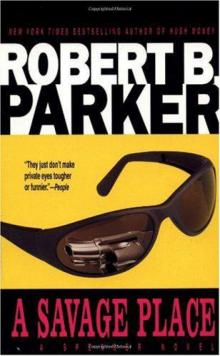 A Savage Place s-8
A Savage Place s-8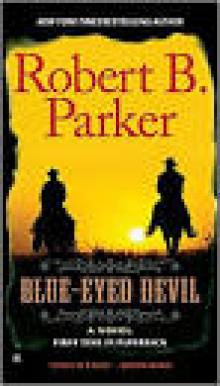 Appaloosa / Resolution / Brimstone / Blue-Eyed Devil
Appaloosa / Resolution / Brimstone / Blue-Eyed Devil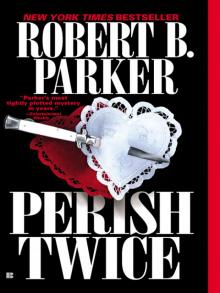 Perish Twice
Perish Twice Spare Change
Spare Change Family Honor
Family Honor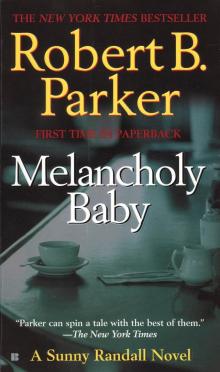 Melancholy Baby
Melancholy Baby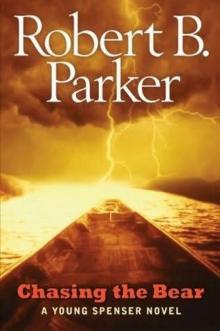 Chasing the Bear
Chasing the Bear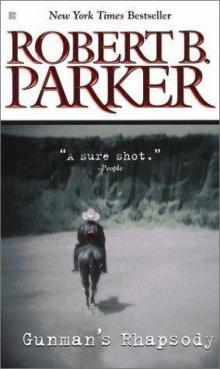 Gunman's Rhapsody
Gunman's Rhapsody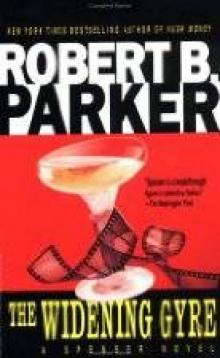 The Widening Gyre
The Widening Gyre Thin Air
Thin Air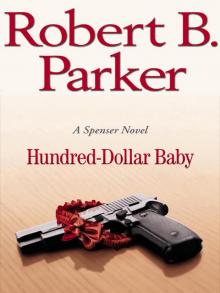 Hundred-Dollar Baby
Hundred-Dollar Baby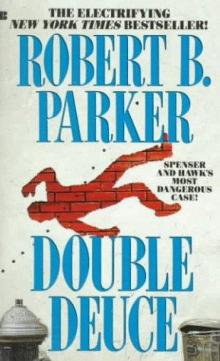 Double Deuce s-19
Double Deuce s-19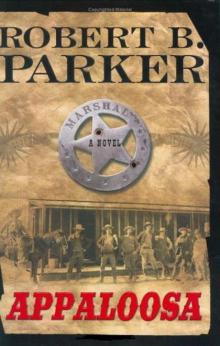 Appaloosa vcaeh-1
Appaloosa vcaeh-1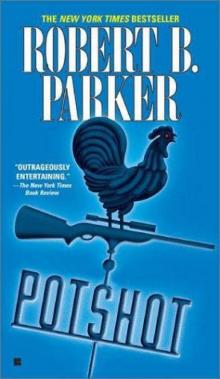 Potshot
Potshot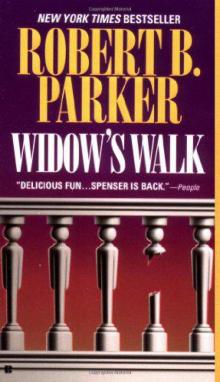 Widow’s Walk s-29
Widow’s Walk s-29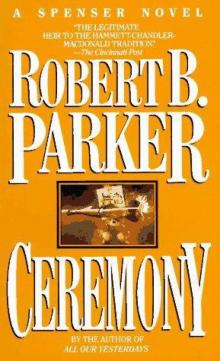 Ceremony s-9
Ceremony s-9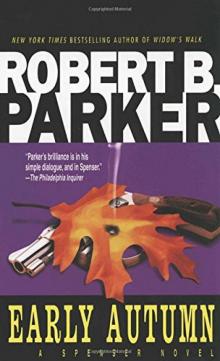 Early Autumn
Early Autumn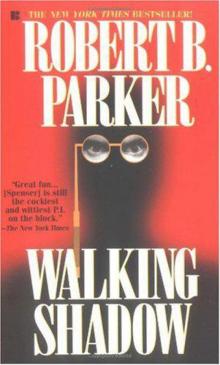 Walking Shadow s-21
Walking Shadow s-21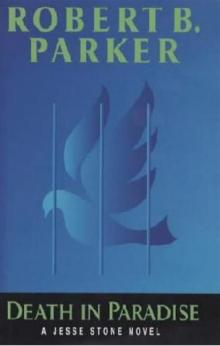 Death In Paradise js-3
Death In Paradise js-3 Shrink Rap
Shrink Rap Blue-Eyed Devil
Blue-Eyed Devil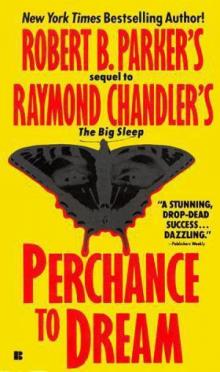 Perchance to Dream
Perchance to Dream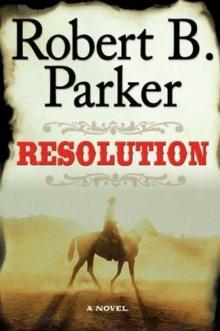 Resolution vcaeh-2
Resolution vcaeh-2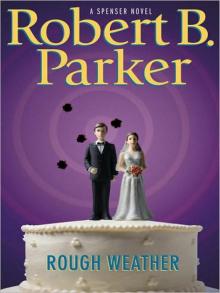 Rough Weather
Rough Weather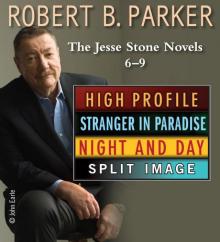 The Jesse Stone Novels 6-9
The Jesse Stone Novels 6-9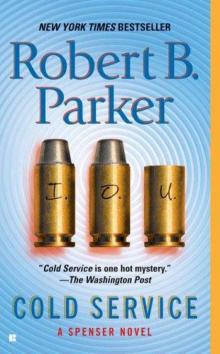 Cold Service s-32
Cold Service s-32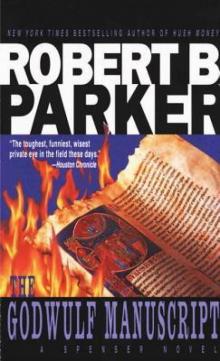 The Godwulf Manuscript
The Godwulf Manuscript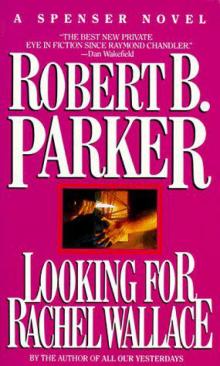 Looking for Rachel Wallace s-6
Looking for Rachel Wallace s-6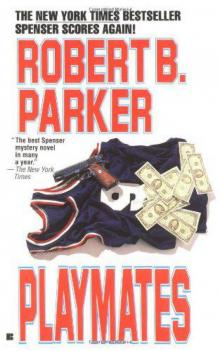 Playmates s-16
Playmates s-16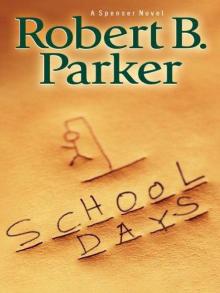 School Days s-33
School Days s-33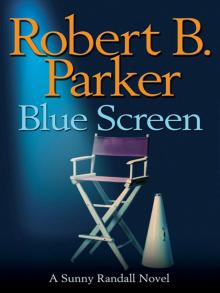 Blue Screen
Blue Screen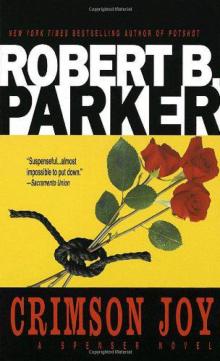 Crimson Joy
Crimson Joy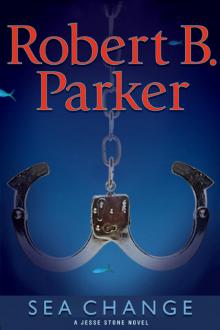 Sea Change js-5
Sea Change js-5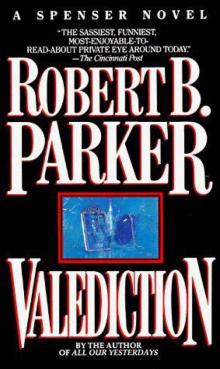 Valediction s-11
Valediction s-11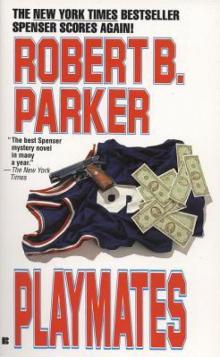 Playmates
Playmates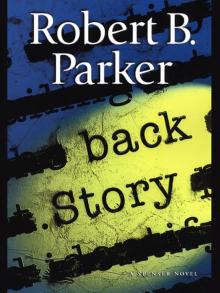 Back Story
Back Story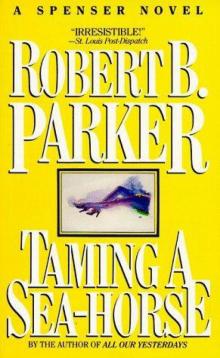 Taming a Sea Horse
Taming a Sea Horse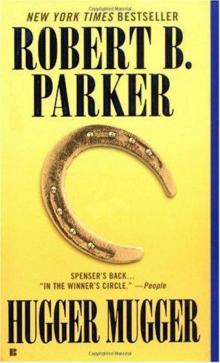 Hugger Mugger
Hugger Mugger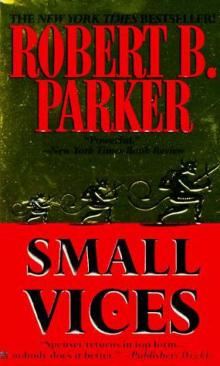 Small Vices s-24
Small Vices s-24 Silent Night: A Spenser Holiday Novel
Silent Night: A Spenser Holiday Novel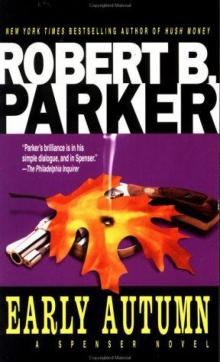 Early Autumn s-7
Early Autumn s-7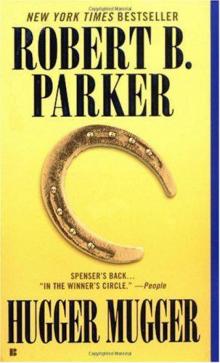 Hugger Mugger s-27
Hugger Mugger s-27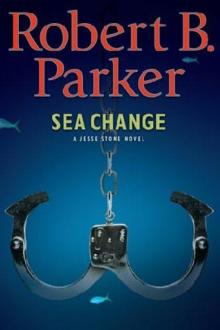 (5/10) Sea Change
(5/10) Sea Change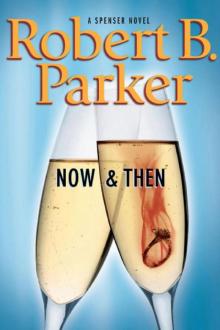 Now and Then
Now and Then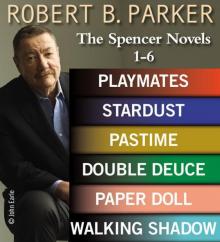 Robert B. Parker: The Spencer Novels 1?6
Robert B. Parker: The Spencer Novels 1?6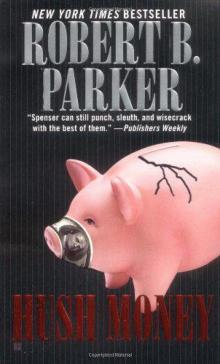 Hush Money s-26
Hush Money s-26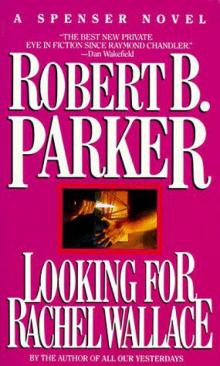 Looking for Rachel Wallace
Looking for Rachel Wallace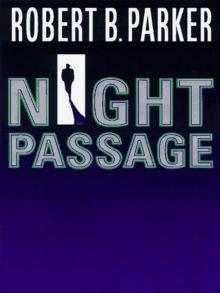 Night Passage
Night Passage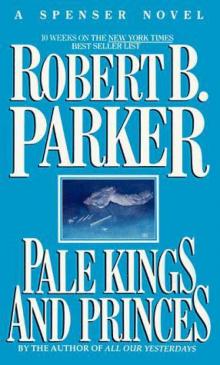 Pale Kings and Princes
Pale Kings and Princes All Our Yesterdays
All Our Yesterdays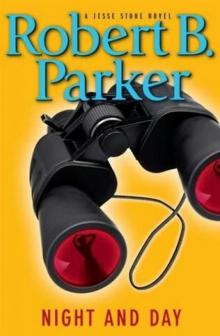 Night and Day js-8
Night and Day js-8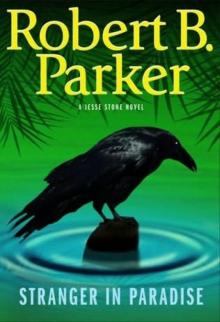 Stranger in Paradise js-7
Stranger in Paradise js-7 Double Play
Double Play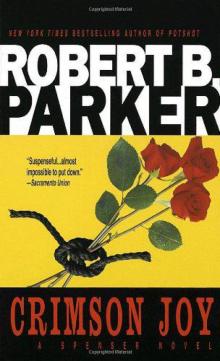 Crimson Joy s-15
Crimson Joy s-15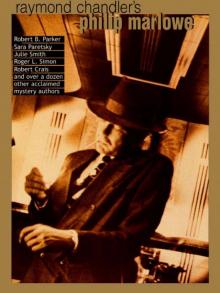 Raymond Chandler's Philip Marlowe
Raymond Chandler's Philip Marlowe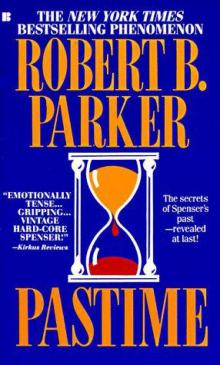 Pastime
Pastime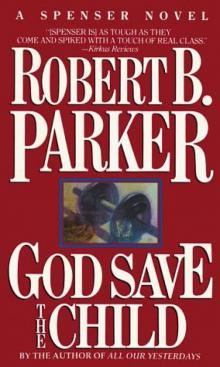 God Save the Child s-2
God Save the Child s-2 Bad Business
Bad Business Trouble in Paradise js-2
Trouble in Paradise js-2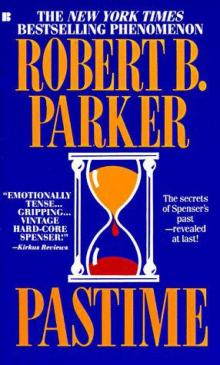 Pastime s-18
Pastime s-18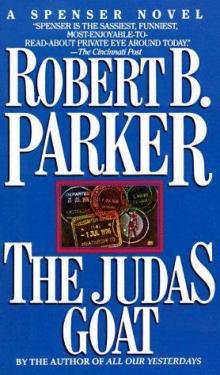 The Judas Goat s-5
The Judas Goat s-5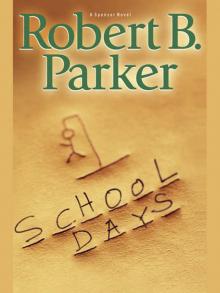 School Days
School Days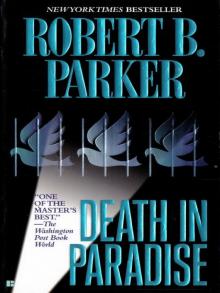 Death In Paradise
Death In Paradise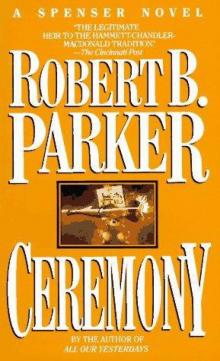 Ceremony
Ceremony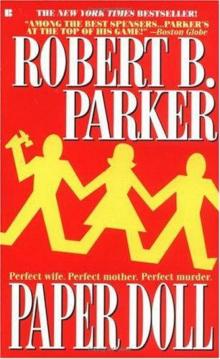 Paper Doll s-20
Paper Doll s-20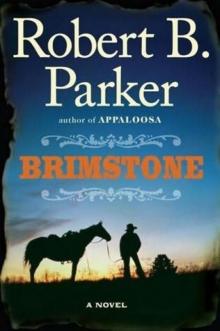 Brimstone vcaeh-3
Brimstone vcaeh-3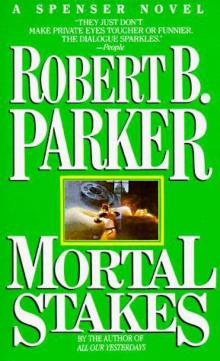 Mortal Stakes s-3
Mortal Stakes s-3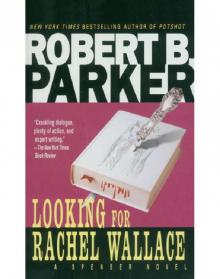 Spencer 06 - Looking for Rachel Wallace
Spencer 06 - Looking for Rachel Wallace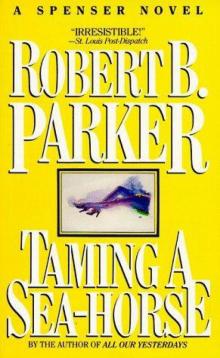 Taming a Sea Horse s-13
Taming a Sea Horse s-13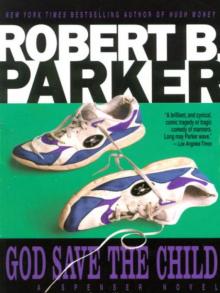 God Save the Child
God Save the Child Chance
Chance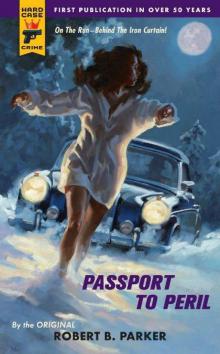 Passport To Peril hcc-57
Passport To Peril hcc-57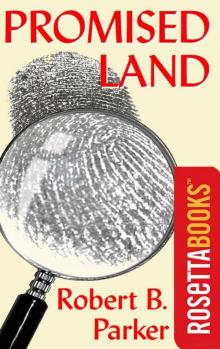 Promised Land
Promised Land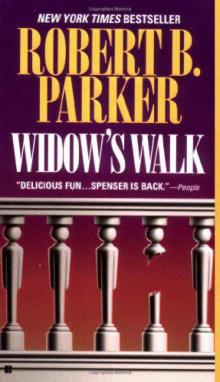 Widow’s Walk
Widow’s Walk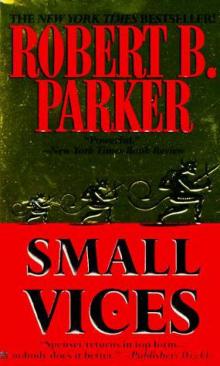 Small Vices
Small Vices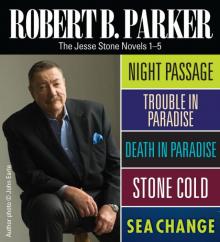 Robert B Parker: The Jesse Stone Novels 1-5
Robert B Parker: The Jesse Stone Novels 1-5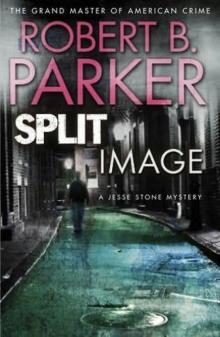 Split Image js-9
Split Image js-9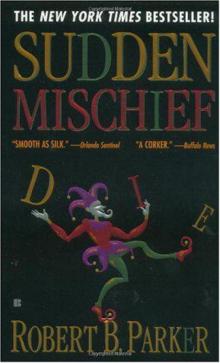 Sudden Mischief s-25
Sudden Mischief s-25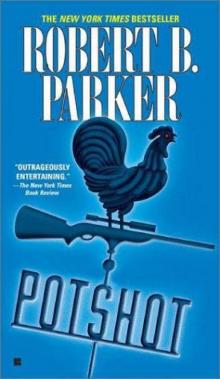 Potshot s-28
Potshot s-28 Split Image
Split Image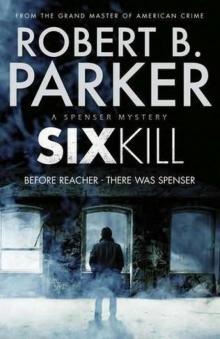 Sixkill s-40
Sixkill s-40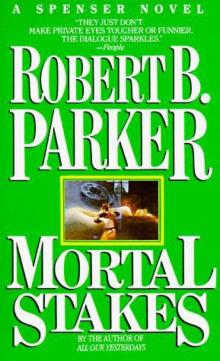 Mortal Stakes
Mortal Stakes Stardust
Stardust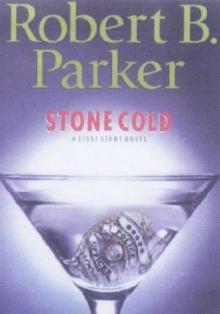 Stone Cold js-4
Stone Cold js-4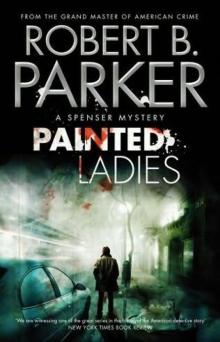 Painted Ladies s-39
Painted Ladies s-39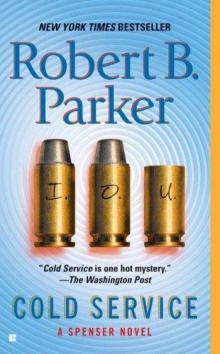 Cold Service
Cold Service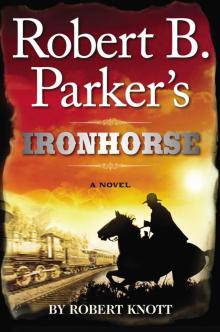 Ironhorse
Ironhorse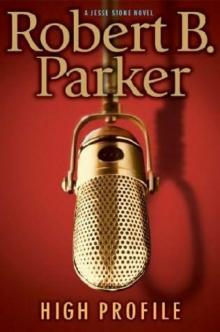 High Profile js-6
High Profile js-6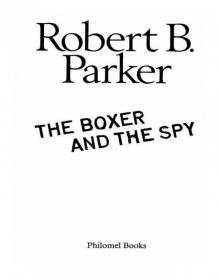 The Boxer and the Spy
The Boxer and the Spy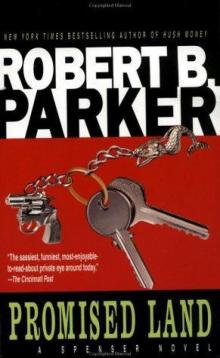 Promised Land s-4
Promised Land s-4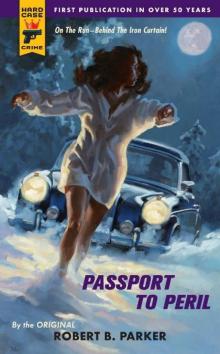 Passport to Peril (Hard Case Crime (Mass Market Paperback))
Passport to Peril (Hard Case Crime (Mass Market Paperback))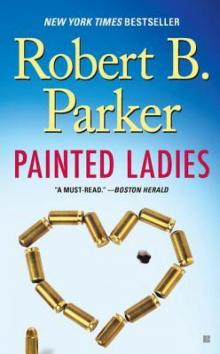 Painted Ladies
Painted Ladies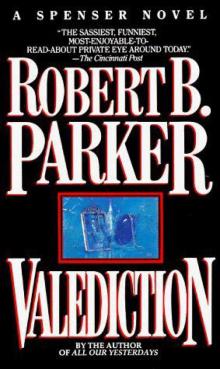 Valediction
Valediction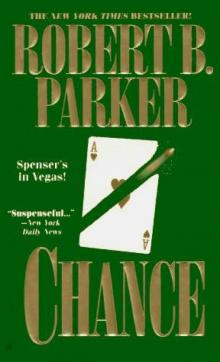 Chance s-23
Chance s-23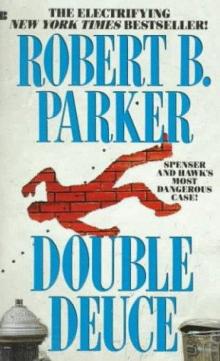 Double Deuce
Double Deuce Wilderness
Wilderness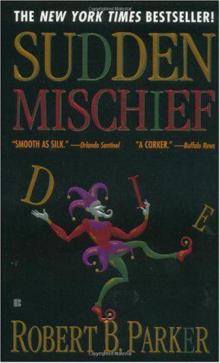 Sudden Mischief
Sudden Mischief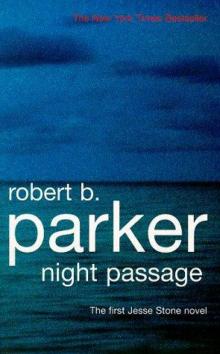 Night Passage js-1
Night Passage js-1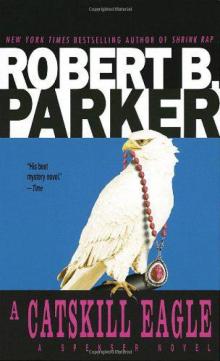 A Catskill Eagle
A Catskill Eagle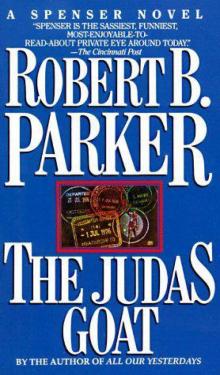 The Judas Goat
The Judas Goat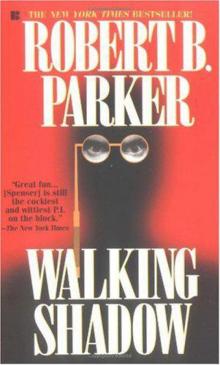 Walking Shadow
Walking Shadow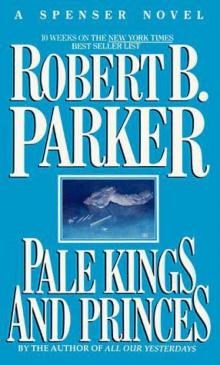 Pale Kings and Princes s-14
Pale Kings and Princes s-14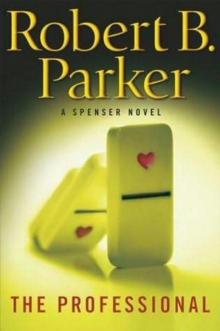 The Professional
The Professional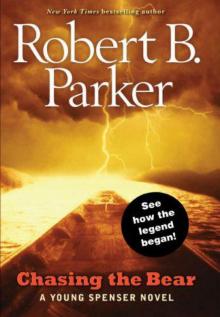 Chasing the Bear s-37
Chasing the Bear s-37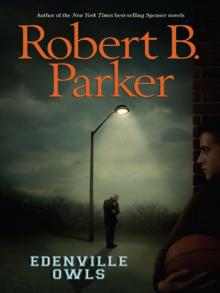 Edenville Owls
Edenville Owls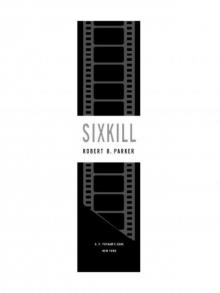 Sixkill
Sixkill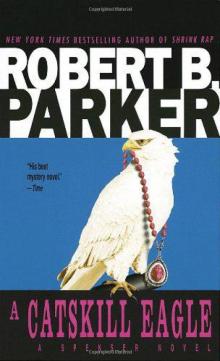 A Catskill Eagle s-12
A Catskill Eagle s-12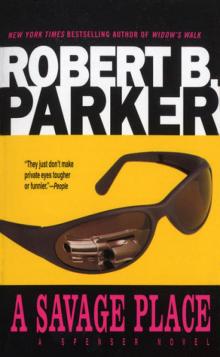 A Savage Place
A Savage Place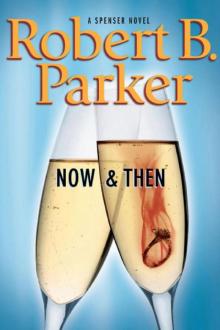 Now and Then s-35
Now and Then s-35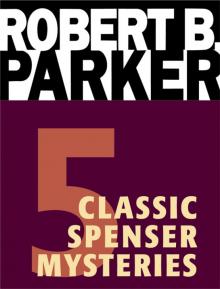 Five Classic Spenser Mysteries
Five Classic Spenser Mysteries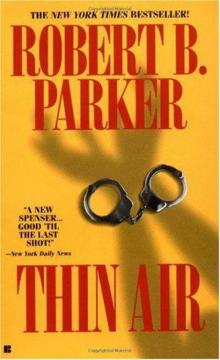 Thin Air s-22
Thin Air s-22